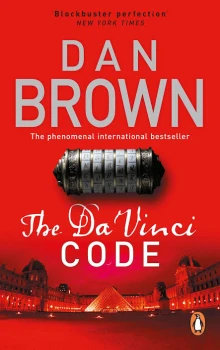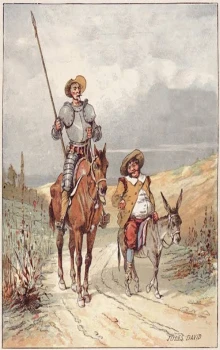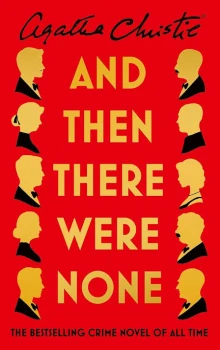“Une plaisanterie numérique?” Bezu Fache was livid, glaring at Sophie Neveu in
disbelief. A numeric joke? “Your professional assessment of Saunière's code is that it is
some kind of mathematical prank?”
Fache was in utter incomprehension of this woman's gall. Not only had she just barged
in on Fache without permission, but she was now trying to convince him that Saunière,
in his final moments of life, had been inspired to leave a mathematical gag?
“This code,” Sophie explained in rapid French, “is simplistic to the point of absurdity.
Jacques Saunière must have known we would see through it immediately.” She pulled a
scrap of paper from her sweater pocket and handed it to Fache. “Here is the decryption.”
Fache looked at the card.
1-1-2-3-5-8-13-21
“This is it?” he snapped. “All you did was put the numbers in increasing order!”
Sophie actually had the nerve to give a satisfied smile. “Exactly.”
Fache's tone lowered to a guttural rumble. “Agent Neveu, I have no idea where the hell
you're going with this, but I suggest you get there fast.” He shot an anxious glance at
Langdon, who stood nearby with the phone pressed to his ear, apparently still listening to
his phone message from the U.S. Embassy. From Langdon's ashen expression, Fache
sensed the news was bad.
“Captain,” Sophie said, her tone dangerously defiant, “the sequence of numbers you
have in your hand happens to be one of the most famous mathematical progressions in
history.”
Fache was not aware there even existed a mathematical progression that qualified as
famous, and he certainly didn't appreciate Sophie's off-handed tone.
“This is the Fibonacci sequence,” she declared, nodding toward the piece of paper in
Fache's hand. “A progression in which each term is equal to the sum of the two
preceding terms.”
Fache studied the numbers. Each term was indeed the sum of the two previous, and yet
Fache could not imagine what the relevance of all this was to Saunière's death.
“Mathematician Leonardo Fibonacci created this succession of numbers in the
thirteenth-century. Obviously there can be no coincidence that all of the numbers
Saunière wrote on the floor belong to Fibonacci's famous sequence.”
Fache stared at the young woman for several moments. “Fine, if there is no
coincidence, would you tell me why Jacques Saunière chose to do this. What is he
saying? What does this mean?”
She shrugged. “Absolutely nothing. That's the point. It's a simplistic cryptographic
joke. Like taking the words of a famous poem and shuffling them at random to see if
anyone recognizes what all the words have in common.”
Fache took a menacing step forward, placing his face only inches from Sophie's. “I
certainly hope you have a much more satisfying explanation than that.”
Sophie's soft features grew surprisingly stern as she leaned in. “Captain, considering
what you have at stake here tonight, I thought you might appreciate knowing that
Jacques Saunière might be playing games with you. Apparently not. I'll inform the
director of Cryptography you no longer need our services.”
With that, she turned on her heel, and marched off the way she had come.
Stunned, Fache watched her disappear into the darkness. Is she out of her mind?
Sophie Neveu had just redefined le suicide professionnel.
Fache turned to Langdon, who was still on the phone, looking more concerned than
before, listening intently to his phone message. The U.S. Embassy. Bezu Fache despised
many things . . . but few drew more wrath than the U.S. Embassy.
Fache and the ambassador locked horns regularly over shared affairs of state—their
most common battleground being law enforcement for visiting Americans. Almost daily,
DCPJ arrested American exchange students in possession of drugs, U.S. businessmen for
soliciting underage prostitutes, American tourists for shoplifting or destruction of
property. Legally, the U.S. Embassy could intervene and extradite guilty citizens back to
the United States, where they received nothing more than a slap on the wrist.
And the embassy invariably did just that.
L'émasculation de la Police Judiciaire, Fache called it. Paris Match had run a cartoon
recently depicting Fache as a police dog, trying to bite an American criminal, but unable
to reach because it was chained to the U.S. Embassy.
Not tonight, Fache told himself. There is far too much at stake.
By the time Robert Langdon hung up the phone, he looked ill.
“Is everything all right?” Fache asked.
Weakly, Langdon shook his head.
Bad news from home, Fache sensed, noticing Langdon was sweating slightly as Fache
took back his cell phone.
“An accident,” Langdon stammered, looking at Fache with a strange expression. “A
friend . . .” He hesitated. “I'll need to fly home first thing in the morning.”
Fache had no doubt the shock on Langdon's face was genuine, and yet he sensed
another emotion there too, as if a distant fear were suddenly simmering in the American's
eyes. “I'm sorry to hear that,” Fache said, watching Langdon closely. “Would you like to
sit down?” He motioned toward one of the viewing benches in the gallery.
Langdon nodded absently and took a few steps toward the bench. He paused, looking
more confused with every moment. “Actually, I think I'd like to use the rest room.”
Fache frowned inwardly at the delay. “The rest room. Of course. Let's take a break for
a few minutes.” He motioned back down the long hallway in the direction they had come
from. “The rest rooms are back toward the curator's office.”
Langdon hesitated, pointing in the other direction toward the far end of the Grand
Gallery corridor. “I believe there's a much closer rest room at the end.”
Fache realized Langdon was right. They were two thirds of the way down, and the
Grand Gallery dead-ended at a pair of rest rooms. “Shall I accompany you?”
Langdon shook his head, already moving deeper into the gallery. “Not necessary. I
think I'd like a few minutes alone.”
Fache was not wild about the idea of Langdon wandering alone down the remaining
length of corridor, but he took comfort in knowing the Grand Gallery was a dead end
whose only exit was at the other end—the gate under which they had entered. Although
French fire regulations required several emergency stairwells for a space this large, those
stairwells had been sealed automatically when Saunière tripped the security system.
Granted, that system had now been reset, unlocking the stairwells, but it didn't matter—
the external doors, if opened, would set off fire alarms and were guarded outside by
DCPJ agents. Langdon could not possibly leave without Fache knowing about it.
“I need to return to Mr. Saunière's office for a moment,” Fache said. “Please come find
me directly, Mr. Langdon. There is more we need to discuss.”
Langdon gave a quiet wave as he disappeared into the darkness.
Turning, Fache marched angrily in the opposite direction. Arriving at the gate, he slid
under, exited the Grand Gallery, marched down the hall, and stormed into the command
center at Saunière's office.
“Who gave the approval to let Sophie Neveu into this building!” Fache bellowed.
Collet was the first to answer. “She told the guards outside she'd broken the code.”
Fache looked around. “Is she gone?”
“She's not with you?”
“She left.” Fache glanced out at the darkened hallway. Apparently Sophie had been in
no mood to stop by and chat with the other officers on her way out.
For a moment, Fache considered radioing the guards in the entresol and telling them to
stop Sophie and drag her back up here before she could leave the premises. He thought
better of it. That was only his pride talking . . . wanting the last word. He'd had enough
distractions tonight.
Deal with Agent Neveu later, he told himself, already looking forward to firing her.
Pushing Sophie from his mind, Fache stared for a moment at the miniature knight
standing on Saunière's desk. Then he turned back to Collet. “Do you have him?”
Collet gave a curt nod and spun the laptop toward Fache. The red dot was clearly
visible on the floor plan overlay, blinking methodically in a room marked TOILETTES
PUBLIQUES.
“Good,” Fache said, lighting a cigarette and stalking into the hall. “I've got a phone call
to make. Be damned sure the rest room is the only place Langdon goes.”





